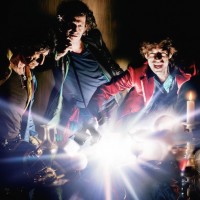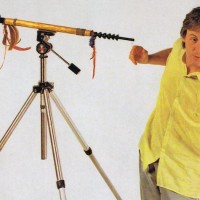It’s not that hard to discern the message behind the title of Billy Bang’s brand new album Prayer For Peace. And just in case you’re not sure, Bang clarifies beyond all doubt in the liner notes:
We do not need war, any kind of war, especially within our homes, our families, our loved ones. Our own unfortunate acts lead to petty arguments, bickering, ugly squabbles and nasty, unnecessary fights. We should search for true harmony and humbleness in our lives. We should listen to each other, and be good to each other.
The plea for peace have come from musicians ranging from John Lennon to U2, but it has a special meaning for this jazz violinist. He served a tour of duty in Vietnam during the Tet Offensive and saw the horrors of war firsthand before even embarking on a professional career as a musician. Steadily gaining traction via his deep involvement in the loft jazz scene of the 1970s with William Parker, Frank Lowe, David Murray and Sam Rivers, Bang expanded his horizons further by later joining bands on the fringes of jazz like the Decoding Society, Bill Laswell’s Material and Bang’s own Forbidden Planet. He also was part of Sun Ra’s Arkestra for the last decade of its existence. All of these experiences culminated in a pair of albums looking back to his stint in Vietnam. Vietnam: The Aftermath (2001) and Vietnam: Reflections (2004) constitute his grand statements, a fascinating blend of Western song structures and Southeast Asian inflections and progressions that seemed to have come together seamlessly.
Bang has been busy since the Vietnam recordings, but he hadn’t released another studio album since then, until this one just last week (although it should be noted that the sessions for Prayer For Peace were recorded in 2005). As Bang’s eloquent quote above reveals, he’s moved from reflecting on the war between countries to decrying the personal wars between individuals. While he makes that point in words, he leaves it up to us to gauge the message coming from the music. Music that might not be the sweeping statements of the Vietnam works, but a continuation of ideas Bang first brought forth then, and before then.
Bang made this record with his working quintet, signaling a desire to put on record what he has been presenting to live audiences and perhaps better capture the immediacy of a more spontaneous performance. James Zollar on trumpet/flugelhorn, Andrew Bemkey on piano, Todd Nicholson on bass and Newman Taylor-Baker on drums make up a conventional jazz foursome made a little unconventional by the addition of Bang’s violin. James Zollar is a key player on this set. His brash but sensitive trumpet is given wide latitude for expression, and you’ll find yourself tuning in to what he’s saying musically as much as Bang.
It’s funny, but with a prominent violinist in just about every era from Stephane Grapelli to Mark O’Connor, Bang’s instrument of choice is still viewed as anomaly in jazz. Like his best forbears, though, Bang makes it a natural fit. A style that’s roughly patterned after Stuff Smith but greatly influenced by the avant garde greats he’s played with, Bang has an unpredictable streak but is always looking to service the melody, too.
The opening of Smith’s “Only Time Will Tell” is Bang’s overt tribute to his musical ancestor, and the most traditional sounding piece of the album. Both Bang and Zollar play of up to the spirit of the song’s vintage swing feel. “At Play In The Fields Of The Lord” is a samba where Bang and Zollar alternate between perfect unison lines and conversational exchanges, with solos by everyone in between. Bang looks East again for “Dance Of The Manakin,” a song built around a repeating figure consisting of Nicholson’s funky bass line and Bemkey’s simple, single line piano notes prancing around it.
The title track is a twenty minute epic, but also the quietest tune of the album. There’s a bit of restlessness churning underneath Bemkey’s unhurried piano that culminates in a lightly swinging second part of the song. There we find Bang playing pizzicato, giving the song a mildly Japanese feel. “Chan Chan” is the other cover of the album, from Compay Segundo of Buena Vista Social Club fame. It’s circular, four-note progression provides a launching point for Zollar’s gritty trumpet and guest percussionists Milton Cardona and Joe Gonzalez enhance the salsa flavor of this modern Cuban folk song. The collection ends with the dark ostinato of “Dark Silhouette” and the spirited Sun Ra tribute “Jupiter’s Future,” where Bang’s violin playing is most unhinged and Taylor-Baker’s dead-on drumming gets spotlighted.
Prayer For Peace is a record that doesn’t pack the punch of the gravitas that made Bang’s Vietnam albums essential, but it makes its impact sure enough with repeated listens. Billy Bang maintains his status of being one of the most important jazz violinists of the last couple of generations with this release, and that’s enough to please any fan of—or newcomer to—his music.
Prayer For Peace is brought to us via the Finland-based concern, TUM Records Oy.
- Ches Smith Quartet – ‘Clone Row’ (2025) - May 30, 2025
- James Brandon Lewis Quartet – ‘Abstraction Is Deliverance’ (2025) - May 27, 2025
- Soft Machine – ‘Drop’ (1971, 2025 remaster) - May 21, 2025





